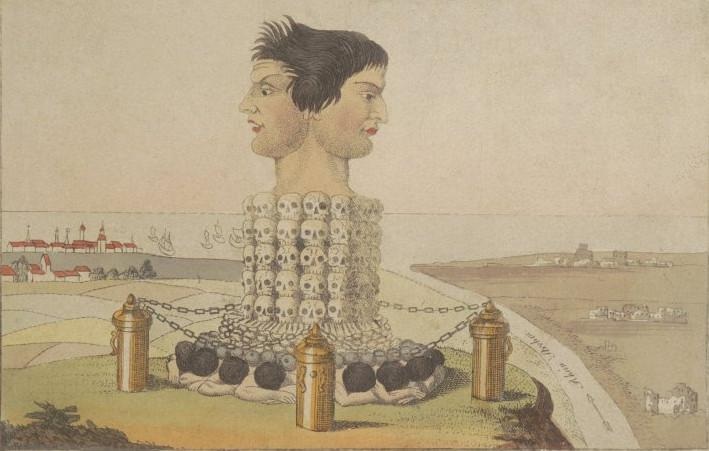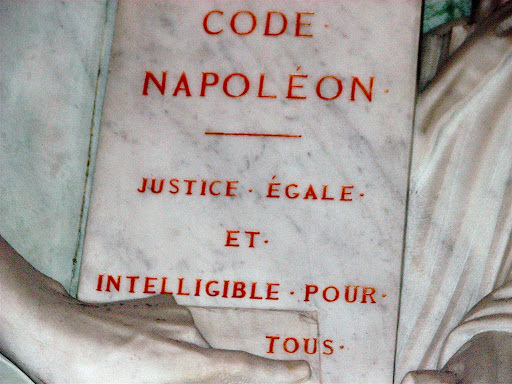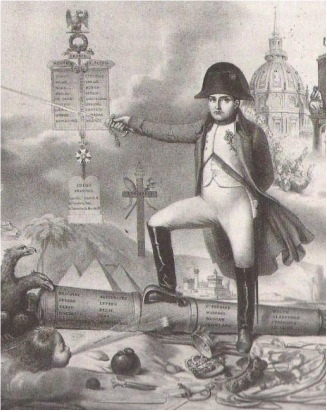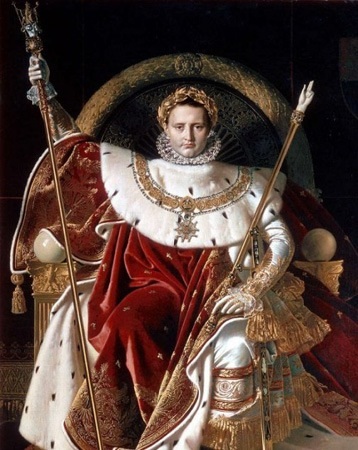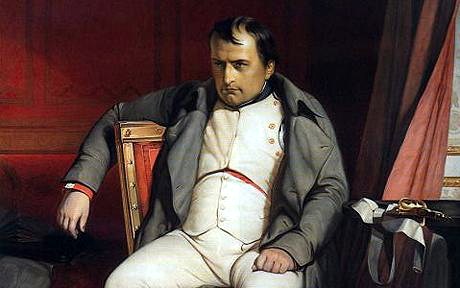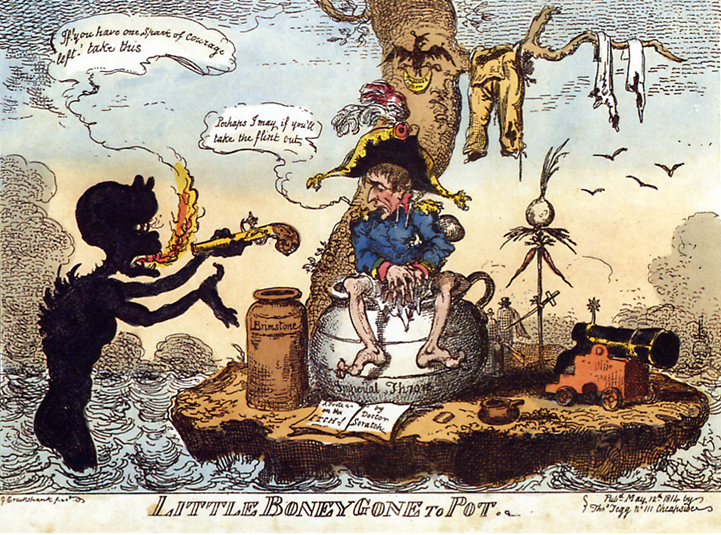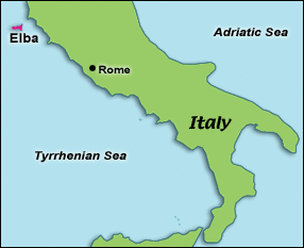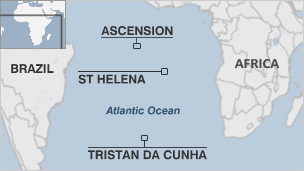Napoleonic Infamy
Part I: Napoleon, The Legislator
|
The Napoleonic Code established some of the pre-revolutionary conservative laws that existed in France for years! The rights of women were limited. The underclass were heavily regulated. The rich got richer, and the privileged few seemed to enjoy the benefits of protection. What specific "limitations" are found in the Code that can serve as an example of "infamy"? Read below. |
Book I: Of Persons
Chapter VI: Of the Respective Rights and Duties of Married Persons
215. The wife cannot plead in her own name, without the authority of her husband, even though should be a public trader, or noncommunicant, or separate in property.
217. A wife, although noncommunicant or separate in property, cannot give, pledge, or acquire by free or chargeable title, without the concurrence of her husband in the act, or his consent in writing.
226. The wife may make a will without the authority of her husband.
Title VI: Of Divorce Section II: Of the Provisional Measures to Which the Petition for Cause Determinate May Give Rise
267. The provisional management of the children shall rest with the husband, petitioner, or defendant, in the suit for divorce...
Title IX: Of Paternal Power
376. If the child [is under sixteen years of age], the father may cause him to be confined for a period which shall not exceed one month...
Book III: Modes of Acquiring Property
Section II: Of the Administration of the Community, and of the Effect of the Acts of Either of the Married Parties Relating to the Conjugal Union
1421. The husband alone administers the property of the community. He may sell it, alienate and pledge it without the concurrence of his wife.
1428. The husband has the management of all the personal property of the wife. He may prosecute alone all possessory actions and those relating to movables, which belong to his wife. [But] he cannot alienate the personal immovables of his wife without her consent.
Additional Notes:
Chapter VI: Of the Respective Rights and Duties of Married Persons
215. The wife cannot plead in her own name, without the authority of her husband, even though should be a public trader, or noncommunicant, or separate in property.
217. A wife, although noncommunicant or separate in property, cannot give, pledge, or acquire by free or chargeable title, without the concurrence of her husband in the act, or his consent in writing.
226. The wife may make a will without the authority of her husband.
Title VI: Of Divorce Section II: Of the Provisional Measures to Which the Petition for Cause Determinate May Give Rise
267. The provisional management of the children shall rest with the husband, petitioner, or defendant, in the suit for divorce...
Title IX: Of Paternal Power
376. If the child [is under sixteen years of age], the father may cause him to be confined for a period which shall not exceed one month...
Book III: Modes of Acquiring Property
Section II: Of the Administration of the Community, and of the Effect of the Acts of Either of the Married Parties Relating to the Conjugal Union
1421. The husband alone administers the property of the community. He may sell it, alienate and pledge it without the concurrence of his wife.
1428. The husband has the management of all the personal property of the wife. He may prosecute alone all possessory actions and those relating to movables, which belong to his wife. [But] he cannot alienate the personal immovables of his wife without her consent.
Additional Notes:
- Under the "New Paternalism” at work, workers were required to carry a work card to attest to their good conduct. Those without cards sent to prisons. Additionally, labor unions were outlawed, yet this allowed for Napoléon to win the support of business owners!
- Though Napoléon valued scientific discovery and helped restore the research institutes destroyed during the wars and revolutionary efforts, he all but eradicated France's literary circles. To Napoléon , writers are useless and dangerous! Many were exiled, or fled...
Part II: Napoleon At War,
The "Quotesman" and the "Quotable"
Perhaps the best way to immortalize an individual is through his words, and through the words said about him. What did Napoleon believe himself to be? And perhaps more importantly, how did his contemporaries view him?
|
“Napoleon’s 1798 invasion of Egypt was a military and political fiasco. The French Republic sent its greatest general to conquer, and he did. But ruling Egypt was another matter. In that, Napoleon did not succeed. Typical Napoleon—an utter failure masked by partial success.
-The Paris Vendetta, a novel |
|
The tale of the Merovingians fascinated Napoleon. Appropriate referred to as the founding dynastic family of the Frankish empire in the fifth century, it was, interestingly enough, their display of golden bees on their cloaks and tapestries that Napoleon prized specifically, choosing to adorn his own clothing with golden bees. The Merovingians were notorious in their hoarding of booty. They stole at will from conquered lands, and their king was responsible for distributing the wealth among his followers. As leader, he was expected to fully support himself with the fruits of his conquests. This concept of royal self-sufficiency lasted from the 5th to the 15th centuries. Napoleon resurrected it in the 19th century. -The Paris Vendetta, a novel. |
|
"What utter madness to believe that one can prevent the truth of history from eventually being written. And the truth on Napoleon? His destruction of the Germanic states, and the reunifying of them, along with Prussia, Bavaria, and Saxony, facilitated German nationalism, which led to their consolidation a hundred years later, which stimulated the rise of Bismarck, Hitler, and two world wars."
-Émile Zola, French writer and poet. |
Part III: Napoleon, The Prized-Possession
|
In 1815, Emperor Bonaparte would succumb to both militaristic and political loss at the Battle of Waterloo. Surrendering to opposing forces, he was eventually banished to the island of Elba, off the coast of Italy, a "gift" of sorts, as he was awarded an island nation, over which he could "command", near his birth home of Corsica. When Napoleon escaped some time later, he was eventually banished to a farther island, the island of St. Helena, in the South Atlantic, off the coast of Africa. Napoleon would die there in 1821, but under suspicious circumstances. Some believe arsenic had been slowly administered in his food and drink, enough to eventually kill him. Modern tests run of strands of hair that survived confirmed high levels of arsenic. But even though, says one historian, "British forces had no reason to kill him. In fact, it was quite the opposite. They wanted him alive.” It is most commonly believed that Napoleon died of stomach cancer.
|
In his last will Napoleon wrote that he wanted his ashes to rest by the banks of the Seine in the midst of the French people whom he loved so dearly. So in 1840, King Louis Philippe decided to honor that wish and bring the emperor home. It was a move meant to both please the public and reconcile the French with their history. By then, Napoleon had evolved into a legend. So on December 15, 1840, in a grandiose ceremony, the king welcomed the remains of the emperor to the Hôtel des Invalides.
Nineteen years had passed since Napoleon’s coffin had been lowered into the earth on St. Helena. Sealed with bricks and cement, reversing that process proved challenging. But when the coffin was eventually opened, it was clear that the emperor remained true to form: The legs remained covered in white britches, the hat still resting beside him where it had been placed years before. The silver dish containing his heart lay between the thighs. His hands—white, hard, and perfect—showed long nails. Three teeth were visible where the lip had drawn back, the face gray from the stubble of a beard, the eyelids firmly closed. The body was in remarkable condition, as if he were sleeping rather than decomposing.
Napoleon's body continues to rest in the lower crypt of the Hôtel des Invalides. It remains one of the most popular tourist attractions in Paris.
Nineteen years had passed since Napoleon’s coffin had been lowered into the earth on St. Helena. Sealed with bricks and cement, reversing that process proved challenging. But when the coffin was eventually opened, it was clear that the emperor remained true to form: The legs remained covered in white britches, the hat still resting beside him where it had been placed years before. The silver dish containing his heart lay between the thighs. His hands—white, hard, and perfect—showed long nails. Three teeth were visible where the lip had drawn back, the face gray from the stubble of a beard, the eyelids firmly closed. The body was in remarkable condition, as if he were sleeping rather than decomposing.
Napoleon's body continues to rest in the lower crypt of the Hôtel des Invalides. It remains one of the most popular tourist attractions in Paris.
